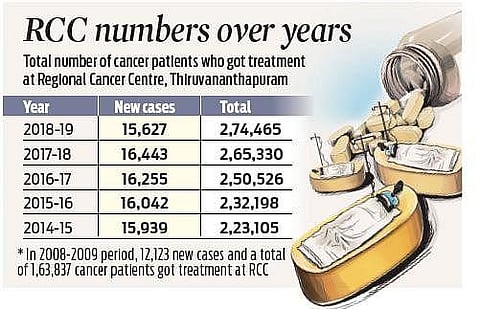

KOCHI: The number of people relying on government-run facilities for cancer treatment in Kerala could give an indication of the alarming rise in cancer cases in the state. According to the 2018-2019 report of the Regional Cancer Centre (RCC), Thiruvananthapuram, 2.74 lakh patients availed treatment at the facility. While 15,627 new cancer cases were registered at the centre that year, 2.58 lakh patients availed further treatment. Another government facility exclusively for treating cancer patients is the Malabar Cancer Centre (MCC), Thalassery.
“Daily, close to 1,000 patients are turning up at RCC for treatment. This shows the rise in cancer patients in the population and there are not enough treatment facilities available for them. Anyone visiting RCC would know its condition. It’s flooded with patients. The facilities at MCC, Thalassery are also not enough to cater to the requirements,” said Dr N K Sanil Kumar, a member of Justice V R Krishna Iyer Movement, which has been in the forefront of the movement for setting up a cancer centre for Central Kerala.
“The 2018-2019 report of the MCC recorded 5,195 admissions. The problem arises when the treatment gets delayed for patients relying on government hospitals. Those who can afford treatment at private hospitals will be able to go with it, but what will happen to the patients who cannot afford it? We all know that early detection is the key,” said Dr Sanil Kumar.
According to a recent report published by National Cancer Registry Programme (NCRP), the number of new cancer cases in India is likely to increase from 13.9 lakh in 2020 to 15.7 lakh by 2025, a rise of nearly 20%. “The incidence and prevalence of cancer have increased over the years owing to longer life spans. Kerala has performed well on all major social indices. In lieu of a larger population of elderly individuals, higher health-related awareness and screening facilities, Kerala has seen a steady rise in the incidence and prevalence of cancer,” said Dr Wesley M Jose, associate professor, medical oncology and hematology, Amrita Hospital, Kochi.
Despite better facilities, the crude mortality-incidence ratio in Kerala is 0.55 among females and 0.75 among males. The breast, colon, rectum, lung, prostate, larynx, liver, ovary and thyroid cancers are also one of the highest in Kerala. “There are multiple reasons for this which are similar to any other developed state or country. For example, delayed childbearing and lower number of children.
The technologically advanced nature of the society, higher economic status, intake of richer food, sedentary lifestyle, higher consumption of meat, alcohol and tobacco, and affordable and accessible screening for cancers all lead to a higher incidence and prevalence. However, mortality from cancer in Kerala is still high and points towards people delaying their treatment due to social pressures, financial strain and lately Covid-related woes,” said Dr Wesley. He said the state must formulate a policy to ensure appropriate and timely cancer care to every citizen at an affordable cost.